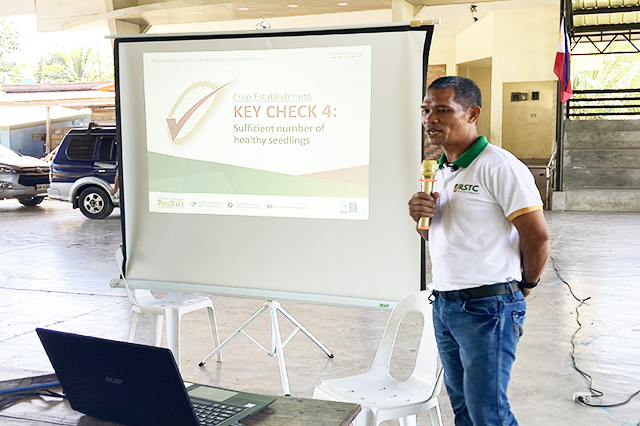
Training the rice specialists so they can help farmers become more competitive is one of the objectives of the Rice Competitiveness Enhancement Fund (RCEF) – Rice Extension Services Program. With rice specialists becoming more competent, fully equipped, and having the heart to help farmers, the country’s rice industry can flourish.
Wilmar Ompoc, one of the Rice Specialists’ Training Course (RSTC) trainees, has always been eager to acquire knowledge to manage his farm better. He attended training programs and seminars before becoming a farm school owner in Bukidnon.
“I did not initially have plans of putting up a farm school but our agricultural technician encouraged me to do so. I did not give it much thought in the beginning because I was hesitant but, later on, I realized it was time to share what I have learned from different training sessions that I have attended to other farmers who also need them,” he recounted.
He began his journey to becoming a rice specialist after being invited to join the season-long training initiated by DA-PhilRice in Agusan. Ompoc accepted the invitation having one goal in mind — to learn the right pest and disease management practices in the rice fields.
“Here in Bukidnon, one of the main problems of rice farmers is the rampant infestation of rice blasts. During the training, it was the number one question I’d always raise to our resource speakers,” he said.
He is grateful that the training shed light on this topic. Ompoc is also happy that the training did not only focus on the technical aspects of rice production, but also on report writing, presentation skills, and visual aids.
“We were also taught how to do lectures through mock presentations and critiquing. I took that very seriously as a farm school owner. I am very thankful that I got to attend RSTC,” he said.
One year after graduating from the RSTC, Ompoc has conducted one FFS in 2021 and is currently conducting another batch of FFS.
As a farm school owner, Ompoc said he pays attention to details especially when being asked of technicalities about a certain topic.
“We usually hire resource speakers and agricultural technicians since we need experts to address questions regarding technical topics, but after becoming a rice specialist through RSTC, I have been serving as the resource speaker. After graduating from RSTC, even our partners from the local agriculture office would come to me for additional information concerning rice production. That’s when I realized how big of a deal it is to become a rice specialist,” he related.
Through RSTC, Ompoc said he acquired an in-depth and intense training on rice production based on the PalayCheck System. This gave him an idea on how to improve his ways in conducting FFS in his farm school.
“For this batch of FFS, I plan on focusing on pest and nutrient management because lately, it has become one of our problems; and solutions to these usually entail chemical use, which is now very costly.”
According to him, he wants his current and future participants to have in-depth knowledge on the PalayCheck System that they would apply on their rice fields.
“If it’s possible for every farm school owner to attend RSTC, I would recommend it. It’s one way to assure that future participants will gain quality information on rice production,” he added.
At present, the DA-PhilRice Agusan is conducting the 12th batch of RSTC with participants across regions 10, 11, and 13. Another batch is expected to be trained this year with participants from Region 9.
The RCEF-RESP is a component of Republic Act 11203 or Rice Tariffication Law authored by Sen Cynthia A. Villar. The RTL allocates P1 billion every year to enhance the capacities of rice farmers to become competitive in rice production. For more information about the program, queries can be sent to DA-ATI thru 0920 946 2474.




